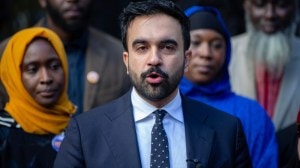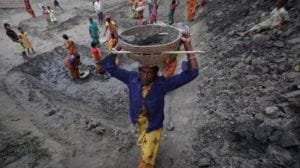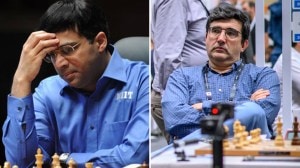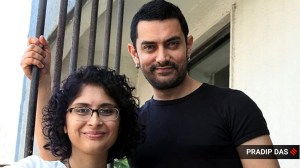From the Urdu Press: ‘Bengal’s grim portents for LS polls’, ‘long NCP battle’, ‘UCC unreasonable when no other law is uniform’
'Going by the current scenario, the portents for the Lok Sabha polls seem to be grim in Bengal. The 2024 polls would not be easy for any party. And it would be a worry for the Election Commission how to ensure a peaceful general election in the state'
 The multi-edition Roznama Rashtriya Sahara points out that most of the dead in this violence were activists of the ruling Trinamool Congress (TMC), although they also included workers from the Opposition parties including the BJP, CPI(M) and Congress.(Express photo by Shashi Ghosh)
The multi-edition Roznama Rashtriya Sahara points out that most of the dead in this violence were activists of the ruling Trinamool Congress (TMC), although they also included workers from the Opposition parties including the BJP, CPI(M) and Congress.(Express photo by Shashi Ghosh) The wave of violence and mayhem which swept through West Bengal during the panchayat polls, marked by killings and electoral malpractices, remained in focus in the news and opinion pages of the Urdu dailies, which sought to decode the deeply-ingrained elements of fear and intimidation in the political culture of the state. They also covered the upheaval in the NCP, examining its ramifications for state as well as national politics. The issue that dominated the Urdu Press, however, was the Uniform Civil Code (UCC), as the dailies tracked every development on this major unfolding story.
ROZNAMA RASHTRIYA SAHARA
Referring to the panchayat poll violence in West Bengal, the multi-edition Roznama Rashtriya Sahara, in its editorial on July 9, writes that in a democracy it is the fundamental right of a citizen to exercise his or her franchise freely and fearlessly and that it is the duty of the authorities to ensure this by conducting free and fair elections.
However, this was not witnessed during the Bengal rural polls, which puts a question mark over claims that foolproof security arrangements were made to ensure a peaceful and smooth election, the editorial says. “Several questions arise. Where were the gaps in these measures that led to large-scale violence and the killings of over a dozen people on the polling day. There answers to these questions would be crucial since the Lok Sabha polls are less than a year away. If the state could be roiled by such violence during the panchayat elections, there would be concerns about what would happen in the course of the Lok Sabha polls.”
The daily points out that most of the dead in this violence were activists of the ruling Trinamool Congress (TMC), although they also included workers from the Opposition parties including the BJP, CPI(M) and Congress. It notes that these incidents were reported from several districts including Murshidabad, Cooch Behar, Malda and South 24 Parganas. “What is surprising is that this could happen despite the deployment of about 70,000 state police personnel and about 65,000 central security force personnel.”
Expressing his concerns, Governor C V Ananda Bose has said that polls should be conducted through ballots and not bullets, the editorial says. “Governor should also examine the factors that marred the rural polls.”
It has been known all along that the rural polls would be a high-stakes affair as they would be a litmus test for every party in the run-up to the 2024 parliamentary polls, the daily says. The cycle of violence has already triggered a blame game between the TMC and the Opposition parties, it notes. The BJP sought to draw a parallel with the Bihar polls in the 1990s. Hitting back, the TMC questioned the role and efficacy of the central forces in ensuring a peaceful election. “Going by the current scenario, the portents for the Lok Sabha polls seem to be grim in Bengal. The 2024 polls would not be easy for any party. And it would be a worry for the Election Commission how to ensure a peaceful general election in the state,” the edit adds.
SALAR
Commenting on the raging battle between NCP president Sharad Pawar and rebel leader and his nephew Ajit Pawar for control of the party, the Bengaluru-based Salar, in its editorial on July 7, says that it was not surprising that at their respective shows of strength in Mumbai, more MLAs showed up at the meeting convened by Ajit than by Pawar. The reason is that the NCP’s legislature wing is at the centre of the Ajit group’s rebellion, which mirrored the split in the Shiv Sena in June last year when Eknath Shinde revolted against party chief Uddhav Thackeray and led his faction to align with the BJP, the editorial says. “And, yet, Ajit could not parade as many MLAs as was claimed, not even two-third of the total party MLAs required for protection from the anti-defection law.”
While the number of the NCP MLAs who showed their allegiance to Pawar was lesser, they still amounted to a significant tally, the daily says. “Notably, Pawar’s current focus is not on the number of the legislators in his camp. He has maintained that the party’s members and supporters are with him. Clearly, this is going to be a long battle between Pawar and Ajit in a replay of what has happened in the wake of the Sena’s split,” it states, adding that now just the number of the defecting MLAs would not clinch the matter in light of the Supreme Court’s judgment in the Senas’ case.
Pawar’s bid to embark on a statewide tour with the avowed objective to rebuild the party would prompt Ajit to hold counter-rallies. So Maharashtra politics is now at a crossroads with the leadership of the two major parties, the Sena and the NCP, engaged in an internecine war, the editorial says. “Both Pawar and Uddhav are now heading to the people’s court with their cases against their own party challengers, who had once been their confidants. It is to be seen whether they get public solidarity, even as a new leadership would also emerge in the process,” the edit says, adding that the changing contours of Maharashtra politics would surface in the coming days.
URDU TIMES
Commenting on the row over the push for a Uniform Civil Code (UCC) for the country, the Mumbai-based Urdu Times, in its leader on July 9, writes that the Muslim community is united in opposing the proposed UCC. “Every sect, every creed, every organisation (of the Muslim community) is against the UCC,” it states, adding that “Muslims do not have differences over Shariat”. The daily says the insistence on rolling out the UCC is “unreasonable” and that “It is not only an invasion of personal lives of Muslims but also that of every citizen”.
The editorial says that pitching for the UCC Prime Minister Narendra Modi had likened the country to a house and had talked about the need for having one law for one house. “But does our house, our country, have one law everywhere? For instance, there has been a ban on alcohol in states like Gujarat and Bihar. But in all others states there is no liquor prohibition,” it says, charging that just to extract mileage in the upcoming elections the UCC bid has been mounted to interfere with the personal laws of every religious community. Such attempts would only lead to division in society, it adds.
The daily states that bringing in more laws would put more burden on courts. “The point is the existing laws are not being properly implemented. For instance, marriages of girls below the age of 18 years are illegal, but these are rampant,” it says. “Islamic laws are meant for the entire humanity, ensuring equality of all human beings.”


- 01
- 02
- 03
- 04
- 05





























